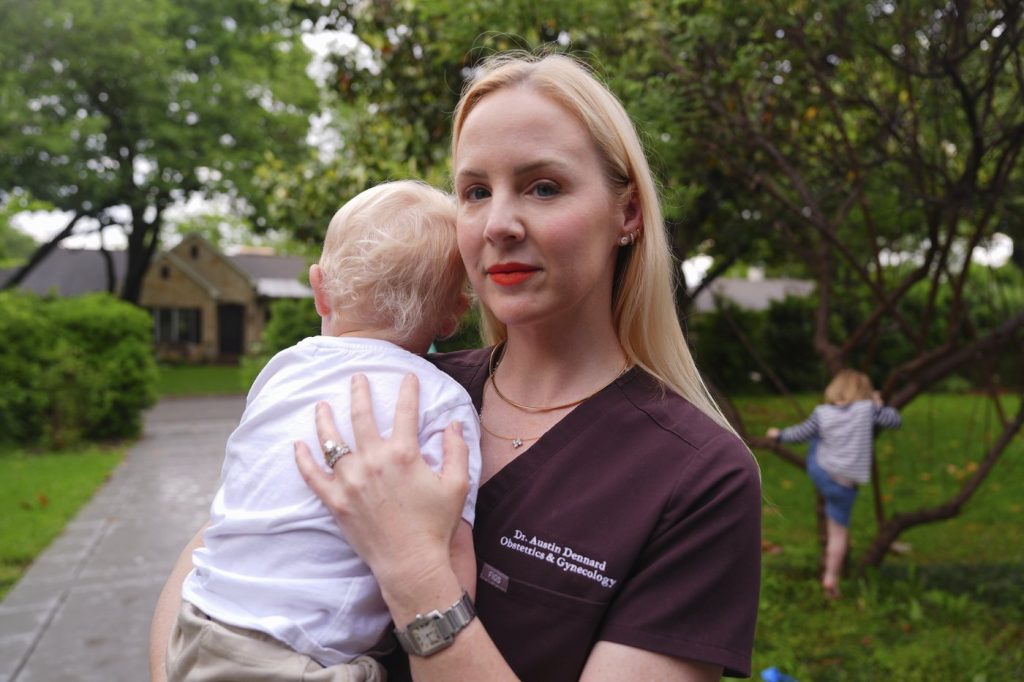AUSTIN, Texas (AP) – Three years ago, Dr. Austin Dennard left Texas for an abortion after her fetus was diagnosed with a fatal condition. She later testified in a lawsuit about how the state’s near-total abortion ban jeopardized her health. Currently, she expresses mixed emotions regarding a new bill intended to clarify medical exceptions under Texas' restrictive abortion laws, as it does not specify particular medical conditions or include fatal fetal anomalies.
On Wednesday, a vital vote is set for a bill that aims to provide clarity around medical exceptions for abortions. This bill represents a significant shift, uniting both Republicans and Democrats—who have historically been divided on this issue—especially after years of defending the state’s abortion ban against legal challenges. Despite bipartisan support, some proponents of abortion rights remain skeptical about the potential effectiveness of the legislation. The proposed bill would clarify that doctors cannot face criminal charges for performing an abortion in a medical emergency that poses a serious risk of bodily harm. However, it does not expand exceptions to include cases of rape or incest.
The bill, which already passed the Senate last month, could move to Republican Governor Greg Abbott for approval as early as Wednesday if it gains support from the GOP-controlled Texas House. Legal challenges and criticism regarding the vagueness of medical exceptions have also been prevalent in other states with similar abortion bans. Across the country, efforts to modify or clarify such exceptions have proliferated since the Supreme Court's decision to overturn Roe v. Wade in 2022, according to the Guttmacher Institute, a research organization advocating for abortion rights.
Proponents of these legislative adjustments argue they could potentially save lives. Critics, however, including some abortion rights advocates, question whether these changes genuinely simplify state abortion laws. In Kentucky, Governor Andy Beshear vetoed a bill that was claimed to provide clarity to the state's near-total abortion ban, arguing that it failed to protect pregnant individuals. Nevertheless, Republican lawmakers eventually overrode his veto.
Previous attempts to clarify medical emergency criteria, such as in South Dakota, have faced backlash from abortion rights advocates due to the lack of specificity in guidelines provided to physicians. Kimya Forouzan, a principal state policy advisor at the Guttmacher Institute, emphasized the difficulty of creating legislation that offers clear compliance standards while not allowing excessive discretion to physicians for non-emergency abortions. Despite this, Texas Republican Senator Bryan Hughes, a key figure behind the state’s abortion ban, insists that the aim of the new bill is to eliminate confusion for healthcare providers.
In 2024, the Texas Supreme Court ruled against Dr. Dennard and other women who alleged they were denied vital abortions due to serious pregnancy complications that endangered their lives and reproductive health. The court stated that existing state laws were sufficiently clear in permitting doctors to perform abortions when the life of the mother is at stake. This situation highlights the broader challenges faced by abortion opponents in navigating medical exceptions within existing laws.
With penalties as severe as fines up to $100,000 and prison sentences reaching 99 years for illegal abortions, Texas' abortion ban currently permits the procedure only under conditions that save the life of the mother. Furthermore, Texas Attorney General Ken Paxton’s office has pursued criminal charges against a midwife for alleged illegal abortion services and is also suing a New York doctor who prescribed abortion pills to a woman in Texas.
In addition to the current legislative efforts, Texas Republicans are working to classify mailing, delivering, or manufacturing abortion pills as a civil offense, which expands on a previous law enacted in 2021. This law allows private individuals to take legal action against anyone they suspect of assisting a woman in obtaining an abortion.











